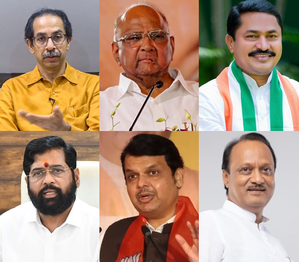Mumbai: The poll battle in Mumbai’s 36 Assembly constituencies has become more intense with the entry of eight major parties including the BJP, Shiv Sena (UBT), Congress, Shiv Sena, NCP, NCP(SP), Samajwadi Party and Maharashtra Navnirman Sena.
Apart from Marathi Manoos, all these parties are making hectic efforts to lure the non-Marathi voters to muster victory for their respective candidates.
The state Assembly election is a prelude to the long pending elections to India’s richest civic body, the BrihanMumbai Municipal Corporation as BJP-Shiv Sena combine in particular proposes to gain supremacy defeating the Uddhav Thackeray-led Shiv Sena which ruled the civic body for 25 years.
For Shiv Sena (UBT), especially after the split in June 2022, the Assembly election is an opportunity to revive and strike back, while for the BJP it is a fight to consolidate its strength especially after its success in the 2017 civic body election and later in the 2019 Assembly polls.
For the Eknath Shinde-led Shiv Sena, it is an attempt to spread its wings in the metropolis riding on the Hindutva thoughts and charisma of Shiv Sena founder Balasaheb Thackeray and Prime Minister Narendra Modi along with the government’s slew of infrastructure development projects.
However, for the Raj Thackeray-led MNS, which is banking on the division of the votes of Marathi Manoos, it is an acid test to emerge as a strong alternative to the Shiv Sena (UBT) which can safeguard the interest of the Marathi Manoos while not harming the non-Maharashtrians.
For the Congress party, it is an opportunity to stay relevant and regain its hold in Mumbai.
Both NCP factions with their negligible presence will have to strive to increase their strengths ahead of the civic body election.
The Samajwadi Party will have to struggle to reach out to the non-Muslim voters piggy-bagging the Maha Vikas Aghadi.
After the clash during the Lok Sabha elections, a similar tussle is visible between the Shiv Sena (UBT) and Shinde faction though they fear that MNS may eat into their votes.
The BJP, which is a big brother in the MahaYuti, made efforts to rope in MNS in the alliance but it did not work.
However, the MahaYuti insiders claim that the MNS’ move to go solo will ultimately help in dividing the Shiv Sena (UBT) traditional voters and after the elections Raj Thackeray may become a part of the MahaYuti, that will add to its strength ahead of civic body elections.
Incidentally, most of the constituencies in Mumbai will witness a triangular contest among the MahaYuti, Maha Vikas Aghadi and MNS.
The Uddhav Thackeray-led Shiv Sena in the Maha Vikas Aghadi is contesting on 22 seats, Congress 11 seats and Sharad Pawar-led NCP two seats in Mumbai.
On the other hand, the BJP is contesting on 18 seats in the MahaYuti, Shinde faction 15 seats and Ajit Pawar faction three seats.
A friendly fight is taking place between the Eknath Shinde-led Shiv Sena and the Ajit Pawar faction in Mankhurd-Shivaji Nagar.
The Samajwadi Party’s sitting legislator Abu Azmi faces a tough challenge in Mankhurd-Shivaji Nagar from the NCP nominee and former legislator Nawab Malik.
On the other hand, the MNS has fielded candidates on 25 seats including Worli where the party nominee Sandip Deshpande is pitted against Shiv Sena (UBT) candidate Aaditya Thackeray and Mahim where party nominee and Raj Thackeray’s son Amit Thackeray is taking on Shiv Sena (UBT) nominee Mahesh Sawant and Shinde faction legislator and nominee Sada Sarvankar.
Although Uddhav and Raj Thackeray are estranged cousins, there is one thing common between them, that is both have fielded their sons in the prestige battle and are putting their might behind them.
During the 2019 Legislative Assembly results, out of 36 constituencies the BJP had won 16 seats and Shiv Sena (united) 14.
After the split in Shiv Sena, Uddhav Thackeray has eight of these MLAs and Chief Minister Eknath Shinde has six legislators in his fold.
The Congress had won four seats, of which one of them joined the Ajit Pawar faction while NCP has two legislators and Samajwadi party one.
Mumbai suburbs will have a large share.
There are 10 constituencies in Mumbai city and 26 constituencies in Mumbai suburbs which will play an important role in the victory of the MahaYuti and MVA.
As North Indians, Gujarati, Marwari and Jain communities are largely located in the suburbs, BJP has benefited in a big way winning more legislators and corporators in the past.
This time too, the BJP expects the repeat of 2019 elections.
The Uddhav Thackeray-led Shiv Sena will not have to work hard in Vikhroli, Bhandup, Dindoshi, Kalina, Worli seats where the party has a solid base but it will have to strive in Dadar-Mahim, Shivadi, Chembur, Jogeshwari East, Dahisar, Magathane, Andheri East, Vileparle, Ghatkopar West, Wadala, Byculla seats.
Incidentally, the Eknath Shinde-led Shiv Sena hopes to outsmart the Shiv Sena (UBT) in Magathane, Andheri East, Jogeshwari East, Chandivali, Kurla, Chembur in the wake of BJP’s support and backing from the non-Marathi speaking voters.
However, the Shinde faction faces major challenges in Bhandup West, Vikhroli, Dindoshi, Dadar-Mahim, Worli, Mumbadevi.
On its part, the Congress hopes to retain Mumbadevi, Dharavi, Malad West seats while Ajit Pawar faction is optimistic to win Anushaktinagar and Mankhurd Shivajinagar.
However, as Sharad Pawar led a faction with a poor party organisational network, its nominee Rani Jadhav faces tough fight from BJP sitting legislator and nominee Parag Shah from Ghatkopar East constituency.
Although the MNS has fielded candidates in 25 seats in Mumbai, it is paying more attention on three seats namely Dadar-Mahim, Worli and Shivadi.
However, the party expects to get sizable votes in Magathane, Bhandup West, Vikhroli and Ghatkopar West.
The Shivadi constituency over the years is seen as the stronghold of Uddhav Thackeray-led Shiv Sena in South Mumbai.
The sitting legislator Ajay Chaudhary is locked in a direct fight against the MNS candidate and former minister Bala Nandgaonkar.
(Sanjay Jog can be contacted at sanjay.j@ians.in)
–IANS


Comments are closed.